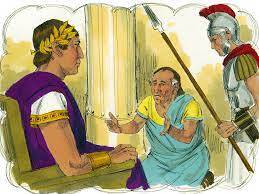
Researchers conducted an experiment to see what could be done to get people’s brains to mirror those of monks who had been meditating for 20 years. As we know, monks cultivate inner calm and love for others through daily meditation and living a healthy, minimally-stressful lifestyle; if there were an Olympics for happiness, my money would be on that group of people. What the researchers found was that there was this one thing–radical forgiveness–that was capable of mirroring in people the relaxed brains of monks after a relatively short period of time. This research led Vishen Lakhiani of Mindvalley to conclude that radical forgiveness was foundational to a happy life.
The Parable Of The Unforgiving Servant
A parable is an earthly story with a heavenly meaning. Jesus was a master storyteller, and he told stories in the form of parables. In Matthew 18, Jesus told a famous parable of an unforgiving servant. His friend Peter had just asked him a question, how often should I forgive my brother, up to 7 times? Jesus responded, not 7 times, but 7 x 70, underscoring the infinite bounds this discipline of forgiveness should have in the life of believers. And then Jesus illustrated his point with this story:
“Therefore the kingdom of heaven may be compared to a king who wished to settle accounts with his servants. 24 When he began to settle, one was brought to him who owed him ten thousand talents. 25 And since he could not pay, his master ordered him to be sold, with his wife and children and all that he had, and payment to be made. 26 So the servant fell on his knees, imploring him, ‘Have patience with me, and I will pay you everything.’ 27 And out of pity for him, the master of that servant released him and forgave him the debt. 28 But when that same servant went out, he found one of his fellow servants who owed him a hundred denarii, and seizing him, he began to choke him, saying, ‘Pay what you owe.’ 29 So his fellow servant fell down and pleaded with him, ‘Have patience with me, and I will pay you.’ 30 He refused and went and put him in prison until he should pay the debt. 31 When his fellow servants saw what had taken place, they were greatly distressed, and they went and reported to their master all that had taken place. 32 Then his master summoned him and said to him, ‘You wicked servant! I forgave you all that debt because you pleaded with me. 33 And should not you have had mercy on your fellow servant, as I had mercy on you?’ 34 And in anger his master delivered him to the jailers, until he should pay all his debt. 35 So also my heavenly Father will do to every one of you, if you do not forgive your brother from your heart.”
Matthew 18:23-35
The king represents God. In Christianity, the God factor bridges the gap between what we should do and what we are capable of doing. That is precisely the moral of this story–when we find it hard to forgive someone rationally, we are supposed to remember God’s irrational forgiveness of us.
Oftentimes, we blame our human nature for our inability to forgive, and understandably so (“To err is human, to forgive divine..”) However, a human nature renewed by faith in God has new capabilities and fresh divine expectations to accompany them (in addition to the example of Christ). Translation? A person of faith can no longer use their human nature as an excuse.
Some of you reading this have been wronged by others in blatant and unconscionable ways. My heart goes out to everyone who has ever suffered physical, emotional or sexual abuse, or been the victim of a serious crime. Forgiveness may be an essential element of the Christian ethic, but there is divine and natural help to aid in the process (don’t go it alone!) I know from my personal experience that all it takes is a single step of intention to begin moving toward healing, however long that takes.
Through the middle of the street of the city; also, on either side of the river, the tree of life with its twelve kinds of fruit, yielding its fruit each month. The leaves of the tree were for the healing of the nations.
Revelation 22:2
I have heard resentment being likened to drinking from a poison cup. I have heard forgiveness being likened to a party. Resentment is toxic, and fuels bad habits and addictions (e.g. this article about the connection between anger and lust). Forgiveness is therapeutic, and fuels an an increase in positive emotion, which is the essence of a party.
For more on the theme of resentment, see Help! I Am Angry With My Parents (5 Healthy Reminders).

